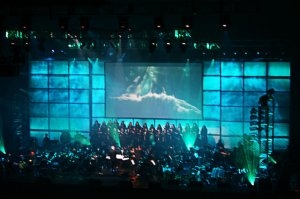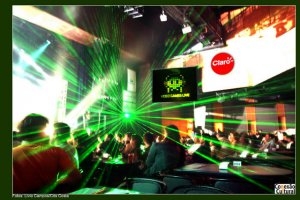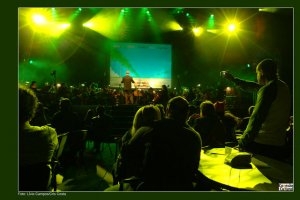![]() BY ADAM BONANNI The many failed conversations I’ve had with my dad are proof it’s not easy to explain to a non-player the appeal and the import of video games, but Video Games Live, an orchestral tribute to the cultural importance of video game music, aims to do just that by delivering an accessible experience of gaming without all that cumbersome pushing of buttons and such. Video Games Live, which comes to the Kimmel Center on Sunday, is the brainchild of game composers Tommy Tallarico and Jack Wall, who have scored hundreds of game titles. There will be lights, there will be video, there will be the orchestra and Tallarico tearing through renditions of One Winged Angel and the epic soundtrack to Shadow of the Colossus, among dozens more. Recently, Phawker gave Tommy Tallarico a call to talk about Video Games Live, modern game soundtracks, and his brief stint on G4, the gaming network.
BY ADAM BONANNI The many failed conversations I’ve had with my dad are proof it’s not easy to explain to a non-player the appeal and the import of video games, but Video Games Live, an orchestral tribute to the cultural importance of video game music, aims to do just that by delivering an accessible experience of gaming without all that cumbersome pushing of buttons and such. Video Games Live, which comes to the Kimmel Center on Sunday, is the brainchild of game composers Tommy Tallarico and Jack Wall, who have scored hundreds of game titles. There will be lights, there will be video, there will be the orchestra and Tallarico tearing through renditions of One Winged Angel and the epic soundtrack to Shadow of the Colossus, among dozens more. Recently, Phawker gave Tommy Tallarico a call to talk about Video Games Live, modern game soundtracks, and his brief stint on G4, the gaming network.
PHAWKER: So, to start off, you are a video game composer. What game soundtracks have you composed?
TALLARICO: Well, I’ve worked on over 275 of them over the last 20 years. Probably some of the more well known ones are from the early 90’s. First one I worked on was the original Prince of Persia; others were the original Earthworm Jim, Aladdin, Terminator, Madden, James Bond stuff, Metroid Prime, the Unreal franchise; mostly Unreal 2. More recently though I worked on the latest Sonic the Hedgehog game, Sonic and the Black Knight.
PHAWKER: Is there anywhere specific from where you draw your influence for the music you compose?
TALLARICO: It depends on the style of the game. We really focus on the emotions; whether they’re being chased, acting happy or sad, scared, or searching for stuff. Emotion plays a big role for what the sound is that we’re trying to achieve.
PHAWKER: Do you have a favorite soundtrack?
TALLARICO: Earthworm Jim was a really fun one to work on. I’d also say a lesser known game for the Xbox  called Advent Rising. There’s a big live orchestra for the score and a tabernacle choir. It sounds a bit like Italian opera.
called Advent Rising. There’s a big live orchestra for the score and a tabernacle choir. It sounds a bit like Italian opera.
PHAWKER: I saw that one’s going to be playing at Video Games Live, Advent Rising.
TALLARICO: We’ve played it in the past, but we haven’t been playing it in a while. We’ve actually created over 60 segments for Video Games Live, but we can only do about 20 per night. We played that one last time we were in Philadelphia, but probably not again this time around. We always change up the show, so whenever we come back, we’ll have a brand new show.
PHAWKER: So Video Games Live is in it’s fourth year. What’s new in terms of production or any new arrangements this time around?
TALLARICO: We have a whole bunch of new material. In terms of new music we have Chrono Cross and Chrono Trigger, Shadow of the Colossus, more of the favorites like Zelda, Mario, Metal Gear Solid and Final Fantasy, Warcraft as well. We added three screenings this year when we only used to have one, updated all the video to HD, more special effects, more lights. All that kind of stuff.
PHAWKER: People might be coming to hear video game music, but the website mentions interactive segments and live action. Can you elaborate on what happens there?
TALLARICO: Well, we have a few segments in the show where I’ll randomly pick somebody out of the audience and they’ll come up on stage and play a video game while the orchestra changes the music on the fly depending on what the person is doing onscreen. We also have a Guitar Hero competition during our pre-show festival and a costume contest. The person who wins the Guitar Hero competition actually comes onstage during the show, and they play Guitar Hero while I play real guitar alongside them and the orchestra. The challenge is to score a certain number of points onstage for a prize. It’s so the audience gets to experience all the rock n’ roll lighting while they’re up on the stage playing on the big screen backed by a whole orchestra. Just like a video game is interactive, we want our show to be interactive. It’s not just a symphony onstage playing video game music; that’s only a small part of what we do. It makes it pretty unique and special that everything is synchronized to big video screens and the lighting and special effects.
PHAWKER: Doesn’t sound like the typical show we get to see at the Kimmel
 TALLARICO: Right, usually there’s going to be the traditional shows doing Mozart, but we wanted to create a kind of hybrid form of entertainment. We wanted to create it for everybody; that was my goal being a game composer for 20 years. I really wanted to prove to the world how culturally significant and artistic video games have become. We wanted to create something for everyone, not just for the hardcore gamer. Even if you’ve never played a game before, you can still go to the show and you’re still able to really follow along with the lights and the video. The music is very serious music. We play all the classics like Mario, Zelda, Castlevania, but we also take quite a bit from modern games as well like Halo, Warcraft, Metal Gear, and stuff that were originally created for orchestras. The best letters and e-mails we get after shows are from the non-gamers, like the girlfriends who came with the guys. Gamers get it, they know the music, but the non gamers are always impressed with how cool game music can sound. It’s not just a bunch of bleeps and bloops. We’re having that effect all over the world now; we’re in Brazil this week, just coming from Japan, and we’ll be in Taiwan the week after Philly. Games are popular all over the world.
TALLARICO: Right, usually there’s going to be the traditional shows doing Mozart, but we wanted to create a kind of hybrid form of entertainment. We wanted to create it for everybody; that was my goal being a game composer for 20 years. I really wanted to prove to the world how culturally significant and artistic video games have become. We wanted to create something for everyone, not just for the hardcore gamer. Even if you’ve never played a game before, you can still go to the show and you’re still able to really follow along with the lights and the video. The music is very serious music. We play all the classics like Mario, Zelda, Castlevania, but we also take quite a bit from modern games as well like Halo, Warcraft, Metal Gear, and stuff that were originally created for orchestras. The best letters and e-mails we get after shows are from the non-gamers, like the girlfriends who came with the guys. Gamers get it, they know the music, but the non gamers are always impressed with how cool game music can sound. It’s not just a bunch of bleeps and bloops. We’re having that effect all over the world now; we’re in Brazil this week, just coming from Japan, and we’ll be in Taiwan the week after Philly. Games are popular all over the world.
PHAWKER: When did the international touring start?
TALLARICO: We did three shows in our first year, 2005, and the third show we ever did was in Vancouver. In 2006, we started playing places like London and Brazil. We’ve been all over the world since then; everywhere from New Zealand to Korea, Singapore, Thailand, Mexico, South America, and Paris. This year we added Poland and Ireland, so we’re just getting bigger.
PHAWKER: You actually play guitar along with the orchestra. What pieces do you play?
TALLARICO: I play on Halo, we play the Advent Children version of One Winged Angel from Final Fantasy VII. Certain pieces of music sound better a little rocked out, so stuff like the Castlevania set and Mega Man where there’s more of a guitar, bass, drums kind of thing, so the orchestra kind of follows along. Other times, the guitar follows along to the orchestra. There’s always four or five key pieces toward the end of the show where we really want to bring up the excitement.
PHAWKER: You’ve probably had less than no time for gaming on the road, but played anything good recently?
TALLARICO: All my gaming, since we’ve been on the road since summer, has been consisting of the portables like the DS, PSP, and my iPhone. I’ve been working through the latest Indiana Jones game on the PSP. haven’t been able to hook up the Xbox Live account recently.
PHAWKER: What’s your take on game soundtracks recently? Nintendo’s making the switch from MIDI music to orchestrated, so any thoughts on modern game music?
TALLARICO: Well yeah, they’re about ten years too late. You know, how great would it be to have a live  orchestrated version of Zelda music? The Zelda pieces are probably one of the most popular pieces we play, which speaks to the power of an orchestral version of the theme. They’ve done some orchestral stuff with Super Smash Bros. Brawl and Mario Galaxy, and every time they do it it sounds awesome. Hopefully they continue to do more. Koji Kondo, who is the genius behind all the Mario and Zelda music, he actually played with us at the show in Japan, he came out and performed Mario live on the piano which was great. He’s very much into interactive music, but there’s definitely some hardware limits and restraints on the Wii with storage capabilities, much less than the Playstation 3 or Xbox 360, so it’s moreso the hardware’s fault rather than the composer. The Wii still has stereo analog outputs, where, going back 10 years, even the Playstation 2 had digital output for 5.1 sound, while the Xbox 360 can go up to 7.1. I think Nintendo does a great job at selling to the masses and they’ve been very successful, but in doing that, you have to keep the price down with the hardware. Unfortunately for us audio guys, one of the first things that suffer are digital output and storage capability, but Nintendo really does have some of the greatest music of all time. They’re starting to switch over now, and hopefully they’ll continue that.
orchestrated version of Zelda music? The Zelda pieces are probably one of the most popular pieces we play, which speaks to the power of an orchestral version of the theme. They’ve done some orchestral stuff with Super Smash Bros. Brawl and Mario Galaxy, and every time they do it it sounds awesome. Hopefully they continue to do more. Koji Kondo, who is the genius behind all the Mario and Zelda music, he actually played with us at the show in Japan, he came out and performed Mario live on the piano which was great. He’s very much into interactive music, but there’s definitely some hardware limits and restraints on the Wii with storage capabilities, much less than the Playstation 3 or Xbox 360, so it’s moreso the hardware’s fault rather than the composer. The Wii still has stereo analog outputs, where, going back 10 years, even the Playstation 2 had digital output for 5.1 sound, while the Xbox 360 can go up to 7.1. I think Nintendo does a great job at selling to the masses and they’ve been very successful, but in doing that, you have to keep the price down with the hardware. Unfortunately for us audio guys, one of the first things that suffer are digital output and storage capability, but Nintendo really does have some of the greatest music of all time. They’re starting to switch over now, and hopefully they’ll continue that.
PHAWKER: Have you ever had any limitations working with soundtracks?
TALLARICO: Oh yes. When I first got into the industry in the early 90’s my entire career was not necessarily about writing great music, but getting it to sound like something in the machine. That’s what we spent the most time on. We had four channels for audio, moving up to six when the Sega Genesis came out, which was a huge deal. Until that, all we had to work with were four mono channels. It wasn’t until the Playstation came out that we could use CD’s and use real music in games. The big revolution in game music came at the turn of the century, because, even though we had CD-ROM capabilities, none of the companies were willing to spend the big bucks on producing real music. Once the turn of the century hit, that’s when we started seeing games like Halo, Kingdom Hearts, God of War, and Medal of Honor with big, serious orchestral scores.
PHAWKER: Going back to something you mentioned before, you said Koji Kondo performed with you in Japan. Is he touring with you?
TALLARICO: He’s not, but every show we try to have special guests. We’re down here in Brazil, and my friend Norihiko Hibino is with us. He’s the composer of all the Metal Gear Solid games. We always try to get local game composers involved, so every show is a little different. We’re going to have a couple special guests in Philly. One guy is an internet sensation known as the blindfolded pianist, who came out with a video of him playing the Mario Bros. theme song blindfolded. It got around four million views on youtube over five years. We also have a girl by the name of Flute Link. She dresses up like Link from the Zelda games and plays Zelda music on the flute. it’s really amazing. We’re also going to have some video game artists, programmers, designers and composers at the show for a quick meet and greet. The VG Expo is actually going on at the same time, so there will be be some famous names in town.
PHAWKER: I was a little late coming to watch G4 the gaming channel, we didn’t get that for a while. You’re not still making appearances on that station?
TALLARICO: Oh hell no. There’s a bunch of people over there, I have no idea what they’re doing in regards to the gaming aspect. It was unfortunate since early on there was alot of interest in G4 and for a 24 hour gaming network. There was a lot of interest initially, but I think the reality was the quality of the shows never really made it to the interest of gamers. Three or four years ago they abandoned the whole game thing really and tried to be more like Spike TV. They had re-runs of Cops and The Man Show. Now it’s become something totally different, and I think they only really have one or two gaming shows on there anymore. It’s too bad since a video game network, if the programming was done correctly, could be a success. There are millions upon millions of gamers in the US who would be willing to support it, but you have to have good programming, and that was the one thing lacking about G4.
VIDEO GAMES LIVE COMES TO THE KIMMEL CENTER FOR TWO SHOWS ON SUNDAY AT 3 PM & 7:30 PM
